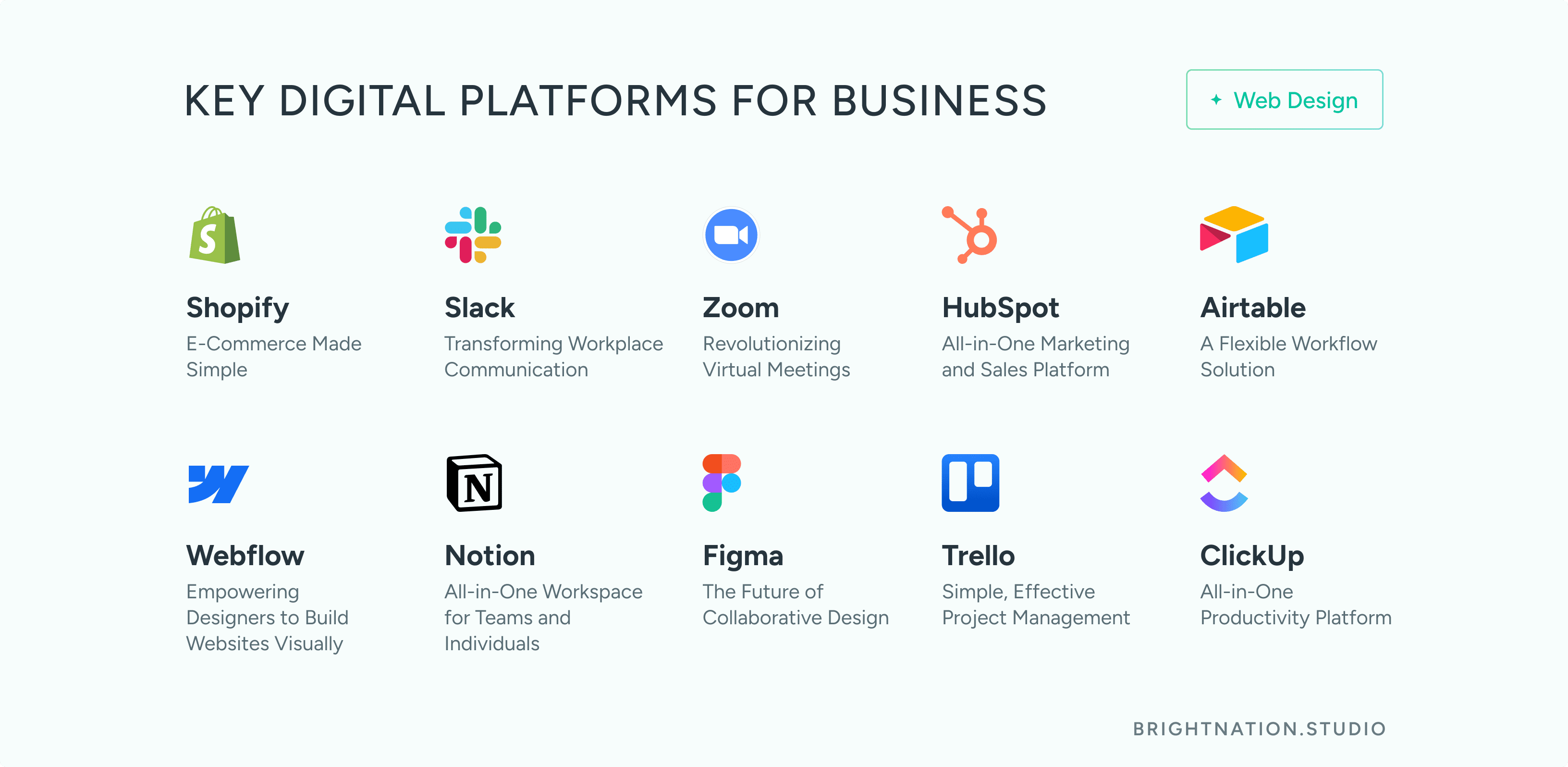The Power of Digital Platforms: Transforming SaaS Success
In today’s business landscape, establishing a robust digital presence isn’t just an option—it’s a strategic necessity. For businesses across industries, a well-designed digital platform serves as a central hub for customer engagement, client acquisition, and brand communication. Whether in e-commerce, communication, or workflow automation, digital platforms are instrumental in driving growth and operational efficiency.
For SaaS companies and beyond, leveraging powerful digital platforms is key to staying competitive in today’s fast-paced environment. These platforms offer innovative tools that not only streamline business processes but also provide unparalleled opportunities to connect with users. Let’s dive into some of the most popular, useful, and trendy platforms shaping the modern digital landscape:

1. Shopify: E-Commerce Made Simple
Shopify is a leading e-commerce platform that enables businesses of all sizes to create and manage online stores. Known for its user-friendly interface, Shopify offers a suite of tools that help entrepreneurs launch their digital storefronts with ease. From customizable themes to seamless payment integration and marketing tools, Shopify makes it easy for businesses to sell products online. Its app marketplace further enhances functionality, allowing users to scale and optimize their stores with minimal technical know-how.
2. Slack: Transforming Workplace Communication
Slack is a workplace communication tool that has become an essential part of remote and in-office collaboration. Offering real-time messaging, video calls, and file sharing, Slack integrates with other popular tools such as Google Drive, Zoom, and Trello to streamline workflows. Its intuitive channels, threads, and notifications make it easy for teams to organize conversations and stay productive, all while reducing email clutter. Slack has become the go-to platform for modern workplaces aiming to enhance communication and efficiency.
3. Zoom: Revolutionizing Virtual Meetings
Zoom is the leading platform for video conferencing and virtual meetings, particularly in the era of remote work. With its easy-to-use interface, high-quality video, and robust features like screen sharing, recording, and breakout rooms, Zoom has become indispensable for businesses, educators, and social events alike. Whether for daily team check-ins or large webinars, Zoom’s scalability and reliability have made it a cornerstone of virtual collaboration.
4. HubSpot: All-in-One Marketing and Sales Platform
HubSpot is an all-in-one platform for marketing, sales, and customer service. With tools for everything from email marketing and lead generation to CRM (Customer Relationship Management) and automation, HubSpot helps businesses grow by streamlining processes and improving customer engagement. HubSpot’s inbound marketing philosophy focuses on attracting, engaging, and delighting customers through personalized content and data-driven insights. Its easy-to-use dashboard and analytics tools provide businesses with everything they need to optimize their sales and marketing strategies.
5. Airtable: A Flexible Workflow Solution
Airtable combines the power of spreadsheets and databases, providing a flexible platform for organizing data and managing projects. Whether for content planning, project tracking, or CRM management, Airtable’s intuitive interface and customization options make it a favorite among teams across various industries. Its drag-and-drop features, integration with other apps, and collaboration capabilities make Airtable a go-to tool for businesses looking for a dynamic and easy-to-use solution to streamline workflows.
6. Webflow: Empowering Designers to Build Websites Visually
Webflow is a popular platform that allows designers to build responsive websites without writing code. It combines the ease of drag-and-drop design with the power of HTML, CSS, and JavaScript, giving designers full control over their websites’ look and feel. With Webflow, users can create professional-grade websites that are fully customizable and optimized for performance. Its integration of design and CMS functionality has made Webflow a favorite among web designers looking to create stunning, responsive sites without relying on developers.
7. Notion: All-in-One Workspace for Teams and Individuals
Notion has gained immense popularity as an all-in-one workspace that combines note-taking, task management, database creation, and collaboration tools. Its highly customizable interface allows users to create personalized workflows, whether for managing personal projects or collaborating with teams. Notion’s ability to integrate multiple functions into one seamless platform has made it a trendsetter in productivity tools, particularly among startups and remote teams.
8. Figma: The Future of Collaborative Design
Figma is a cloud-based design tool that has revolutionized the way teams collaborate on UI/UX projects. Unlike traditional design software, Figma allows multiple team members to work simultaneously on the same project in real-time, making it perfect for distributed teams. Its robust prototyping, design systems, and vector editing tools make Figma a favorite among designers looking to streamline workflows and foster collaboration without compromising on creativity.
9. Trello: Simple, Effective Project Management
Trello is a popular project management tool that uses boards, lists, and cards to help teams organize tasks and collaborate effectively. Its simplicity and visual approach to project management make Trello an easy-to-use tool for individuals and teams of all sizes. Trello integrates with other platforms like Slack, Google Drive, and Jira, allowing users to manage workflows across different tools seamlessly. Whether for agile development or everyday task tracking, Trello has become a go-to solution for organizing work visually.
10. ClickUp: All-in-One Productivity Platform
ClickUp is an all-in-one project management and productivity platform that combines task management, goal tracking, document collaboration, and time management. It’s highly customizable, allowing teams to create workflows tailored to their specific needs. Whether for project planning, team collaboration, or task automation, ClickUp offers comprehensive features that support individuals and teams across industries. Its flexibility and robust integrations make it an ideal solution for those looking to streamline complex projects.